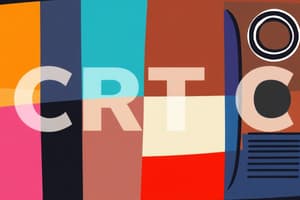Podcast
Questions and Answers
The Broadcasting Commission was established under the Telecommunications Act of 1996.
The Broadcasting Commission was established under the Telecommunications Act of 1996.
False (B)
The Press Association of Jamaica has regulatory authority over media content.
The Press Association of Jamaica has regulatory authority over media content.
False (B)
Violations of media regulations can result in penalties, including license suspension.
Violations of media regulations can result in penalties, including license suspension.
True (A)
The 'Children's Code for Programming' is aimed solely at adult audiences.
The 'Children's Code for Programming' is aimed solely at adult audiences.
Jamaica’s legal framework for media does not consider the protection of societal values.
Jamaica’s legal framework for media does not consider the protection of societal values.
The 'Guidelines for Political Broadcasts' require unequal airtime for political candidates.
The 'Guidelines for Political Broadcasts' require unequal airtime for political candidates.
The Broadcasting Commission evaluates license applications for television, radio, and subscriber television services.
The Broadcasting Commission evaluates license applications for television, radio, and subscriber television services.
The 'Directive on Transmission of Soca/Calypso Content' promotes explicit music on the airwaves.
The 'Directive on Transmission of Soca/Calypso Content' promotes explicit music on the airwaves.
Flashcards
Broadcasting Commission
Broadcasting Commission
A Jamaican regulatory body responsible for overseeing television, radio, and subscription television services. It ensures compliance with broadcasting regulations, technical standards, and ethical guidelines.
Press Association of Jamaica
Press Association of Jamaica
A self-regulatory body that focuses on maintaining journalistic integrity and upholding press freedom in Jamaica. It advocates for ethical practices and defends the rights of journalists.
BRRA Act (1996)
BRRA Act (1996)
The Broadcasting and Radio Re-Diffusion Act of 1996 forms the legal foundation for regulating broadcasting in Jamaica.
Children's Code for Programming
Children's Code for Programming
Signup and view all the flashcards
Directive on Transmission of Content Promoting Illegal Activities
Directive on Transmission of Content Promoting Illegal Activities
Signup and view all the flashcards
Content Regulation in Jamaica
Content Regulation in Jamaica
Signup and view all the flashcards
Equal Airtime for Political Candidates
Equal Airtime for Political Candidates
Signup and view all the flashcards
Structured Rating System for Content
Structured Rating System for Content
Signup and view all the flashcards
Study Notes
Media Regulation in Jamaica
- Jamaica's media is regulated by legal frameworks to protect public interest and ethical standards.
- Regulations cover print, broadcast, and digital media.
- Enforcement is primarily by the Broadcasting Commission and the Press Association of Jamaica.
Broadcasting Commission
- Established under the Broadcasting and Radio Re-Diffusion Act (BRRA) of 1996.
- Regulates television, radio, and subscriber television services.
- Evaluates license applications and monitors programming compliance.
- Ensures adherence to technical standards.
- Penalties for violations (e.g., broadcasting indecent content, promoting illegal activities) range from fines to license suspension.
- Specific directives, such as the "Children's Code for Programming" and "Directive on Transmission of Content Promoting Illegal Activities," protect audiences.
Press Association of Jamaica
- Focuses on maintaining journalistic integrity and defending press freedom.
- Lacks direct regulatory authority but acts as a watchdog.
- Ensures media practitioners follow ethical journalism practices.
Key Media Laws and Directives
- Emphasize content regulation (e.g., Television and Sound Broadcasting Regulations).
- "Directive on Transmission of Soca/Calypso Content" restricts explicit music broadcasts.
- "Guidelines for Political Broadcasts" mandate equal airtime for political candidates.
- Rating systems ensure content suitability for specific audiences and protect children, e.g., by preventing exposure to graphic violence or inappropriate themes.
Studying That Suits You
Use AI to generate personalized quizzes and flashcards to suit your learning preferences.




